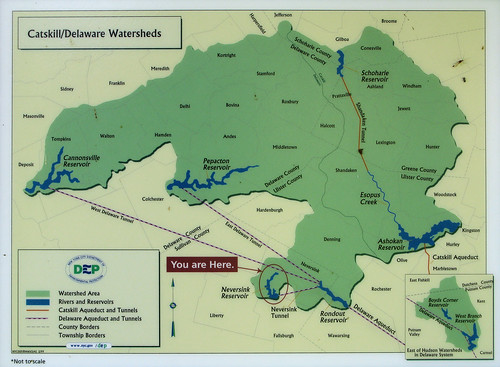 |
| NYC's Catskills/Delaware water collection system — from an explanatory sign overlooking Neversink Reservoir — a shot by jeffs4653 on Flickr. Note that the land misleadingly depicted in green is actually 70% privately owned. These private lands could be currently valued at more than $2,000 per acre — particularly at the westernmost end — just for oil and gas leasing purposes. But not anymore — since, on July 1, 2011, NYS initiated an outright ban on the private sector developing shale gas from these areas. |
Below are some quotes [portions underlined by me] from prepared remarks by former NYS DEC Commissioner Alexander "Pete" Grannis, who served under the previous Paterson Administration. Grannis was speaking before a NYS Assembly hearing, Oct. 15, 2009, shortly after release of what turned out to be only a first-draft SGEIS. (That's the cumbersomely named regulatory tome intended to systematically break down the new impacts expected, and the new rules needed, to produce natgas from Marcellus or Utica shale in NYS.)
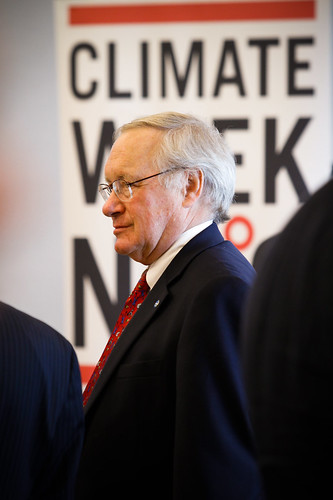 |
| Former NYS DEC Commissioner Alexander "Pete" Grannis at an event in NYC, September 20, 2010, shortly before his firing during the final months of the Paterson Administration. This is a photo by TheClimateGroup on Flickr. |
Grannis' full text is still online here, but — given the contrast between the then and now, and that Grannis served the prior administration — it may not stay up for much longer.
"The dSGEIS calls for extensive protections for public water supplies, with additional protections identified for primary and principle aquifers, and the New York City watershed. DEC of course is as committed to the filtration avoidance determination as the City administration. I have said it before and I will say it again: DEC will not permit drilling that would jeopardize the City's watershed, or, for that matter, any other watershed..."Looking back in time, Grannis' text strongly illuminates a turnabout in NYS DEC policy, triggered over the last three years of the Late Great Hydro Fracking Debate. The change is especially marked with regard to the question of whether private interests should be allowed to make private deals to develop shale gas under private lands — when those lands happen to be located uphill from places where big cities collect (but don't want to filter) their drinking water.
"While DEC is fully committed to protecting the New York City watershed, it should be noted that approximately seventy percent (70%) of the land in the New York City watershed is privately owned. While there have been many calls for an outright ban on drilling within the New York City watershed, such a ban would limit the mineral rights of the private property owners. Our conclusion, following the comprehensive evaluation of the drilling process, assessment of impacts, and implementation of mitigation measures, is that if drilling takes place pursuant to the dSGEIS there is no substantive basis to believe that water quality will be degraded in the New York City watershed, or that the filtration avoidance determination will be impacted..."
"As much of the discussion regarding the New York City watershed to date has been a general expression of conclusions, the public comment period is an opportunity for the proponents of special restrictions in the City's watershed to objectively and substantively explain with specificity the underlying basis for their risk assessment, and directly address how the mitigation measures proposed are in their view insufficient, bearing in mind the legal standards we must follow in taking administrative action, and the State's burden if it were to act in a way that impacts on private landowner rights..."
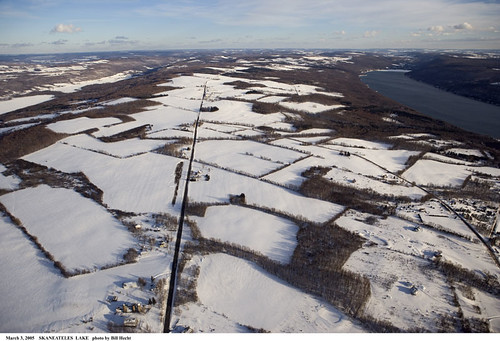 |
| Farmland draining to Skaneateles Lake — should winter ever end is another terrific aerial by Bill Hecht (2005), as posted by lvanvlee8 on Flickr. |
Then, for months afterwards, the public firestorm grew.
In April 2010, Grannis — at Paterson's behest, or with his backing — unilaterally threw those same landowners into a special class of unpaid, uncompensated, paper-rights-holding people — but only in such a way as to bureaucratically try to weasel out of the "takings" question. Yes, yes, a driller could still drill in those so-called watershed areas — theoretically, maybe, some day — but only if it first succeeded in shepherding through to completion a site-specific environmental impact statement, presumably a new one for every series of wells from a single well pad.
Still thereafter, New York City remained wildly unsatisfied with this level of "protection" — to put it mildly.
Then, in July 2011, DEC Chief Joseph Martens — with the backing of the Cuomo Administration — dropped even any remaining pretense of balance on this question. In the unfiltered, big-city watershed areas (and over certain publicly significant groundwater supplies — all of which are filtered before consumption, without controversy, or excessive expense, by the way), outright bans are now on the cusp of being permanently imposed against the exercise of certain key, long-standing property rights.
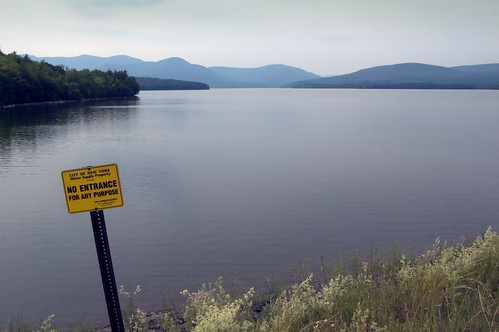 |
| NYC's off-limits Ashokan Reservoir in upstate, a photo by CarbonNYC on Flickr. |
[Basically, in certain geographic places where the public interest in water seems like it's threatened by private rights in minerals, the landowners have simply lost. And nobody proposes the public interest should pay a nickel for its imposition! Just so it's clear to readers where I stand on this issue, let me just say this: I'm actually okay with these bans, at least for the time-being — but only if government double-checks its popularly-driven zeal for controlling everything with the very significant public expense of being fair to these landowners. If all taxpayers or water rate payers had to temporarily lease, or permanently buy out, these mineral rights — then how controlling would they demand to be, really? It's easy to be in favor of controlling everything, and banning everything, when there's no consequence for you personally. But there should be no free lunch. In fact, if the public actually took control of these mineral rights, by force or by open market, I believe — in the long run, after the dust had settled — government could eventually find a way to itself responsibly drill and frack and make some income from those areas. The New York City Water Department could be in charge of deciding when and how and whether to supply consumers with both clean drinking water, and clean-burning natural gas — from the very same lands. If it turns out NYC doesn't want to ever do both — well, then, that's their privilege as owner!]
I don't agree with the rhetoric of anti-drillers very often. I can really only think of a couple recurring themes from the anti's which ring true with me. (One of these revolves around incessant pleas for delay — based on the assertion that fossil fuels still in the ground will only get more and more valuable, as time goes on. To me, that sounds like a reasonable forecast — but it's also an assessment of the future that I think the actual owners should be in charge of interpreting and acting upon.)
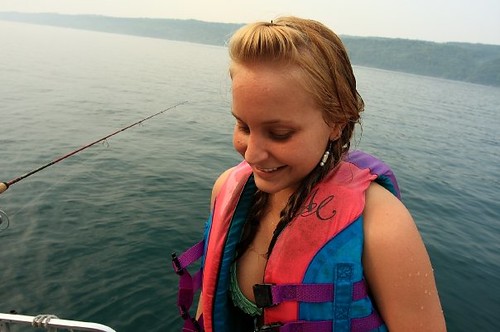 |
| Young woman recreating in Skaneateles Lake (my source of drinking water as a Syracusan), is a photo by Chris_Park on Flickr. |
In the case of the water issue, the agreed-upon truth here, between me and opponents, has to do with the fact that the NYS DEC has made numerous distinctions between how to regulate different areas of upstate — but solely for political reasons, hidden behind a tangled web of expert obfuscation, and scientific analysis.
I agree with the opponents: This is not science. This is pure naked politics — calculated to divide, to conquer, and to get it done, already.
And, I admit, like most of New York, I'm basically okay with that. But only if you're upfront about it. And only if you compensate the victims of these game-changing, regulatory decisions. The current leaders of New York State no longer talk anymore about any of this — like Grannis once did, just two short years ago. And there is not a single mainstream reporter working in New York State today with the intelligence — or the true sense of fairness — to ask these kinds of deep, real-world questions. (Instead, they're all still stuck on the same half-dozen non-issues, posed and re-posed by anti-drilling activists.)
This new plan offers several proofs that politics have indeed trumped, without challenge, rational regulation.
On state lands, old-school drilling (and, in fact, old-school fracking) are still allowed — as these resource extractions have been routinely allowed, in the same way as tightly controlled timber-cutting has been routinely allowed, throughout the state's history of post-Depression land ownership. (Woe — the pitiful memories of upstate media: NYS's last oil and gas lease auction on public lands was as recently as 2006, and those leases still haven't expired!) But now we see that shale gas development — at least if undertaken from the surface of those state lands — has been suddenly ruled inconsistent with the public purpose of those forests. Why? What about the public purpose represented by the plight of taxpayers in a state that has so few alternate sources of income to pay its rather significant bills? What is so different between conventional and unconventional drilling that makes the latter so inconsistent with management of public lands? Both have impacts. Both have benefits. Both can be safely done — the DEC just said so. The science which purportedly underlies the distinction is very hard for me to see. In fact, I don't think it's there. Much more noticeable is the politics of throwing opponents a sacrificial scalp, so they can go back to their people in a self-congratulatory way, telling the tale about how they won this battle.
 |
| Farm along East Lake Road overlooking Skaneateles Lake, a photo by anoop! on Flickr. |
Again, I agree with the drilling opponents: The regulatory distinctions here are not about science, facts, or what's known about actual environmental impact. The distinctions are about calming the political passions of those millions of New Yorkers who have — at the voices of often outrageously inaccurate, agenda-driven persuasiveness — lost their heads.
It is disgusting to me, really, the extent to which our publicly employed experts abuse their position and their expertise — by pretending, by never coming clean, and by never simply saying out loud what the Real Deal is.
In fact, they are dishonest — because honesty is too ferociously punished by the body politic.
Anyway, you can think what you want. And you can say what you want. But let me just say this, before it's too late: This sort of bald dishonesty — popularly enforced against the very same experts upon which most of us ordinary people desperately rely — is a very dangerous game.

No comments:
Post a Comment